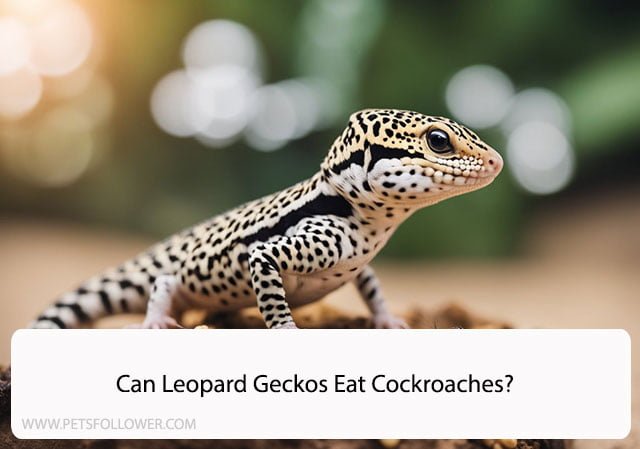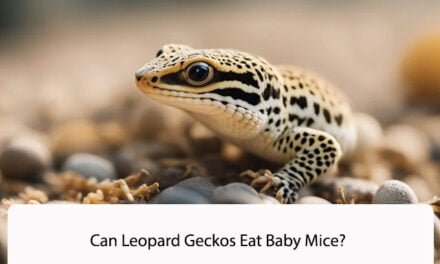Leopard geckos are fascinating creatures that make great pets for reptile enthusiasts. As with all pets, it is important to provide them with a well-balanced diet to ensure their health and longevity. One question that often arises when it comes to feeding leopard geckos is whether or not they can eat cockroaches.
The answer is yes, leopard geckos can eat cockroaches. In fact, cockroaches are a great source of nutrition for these reptiles. They are high in protein, low in fat, and contain important vitamins and minerals that are essential for a leopard gecko’s health. However, it is important to note that not all types of cockroaches are safe for leopard geckos to eat. Some species may carry diseases or parasites that can be harmful to your pet.
Nutritional Benefits of Cockroaches for Leopard Geckos
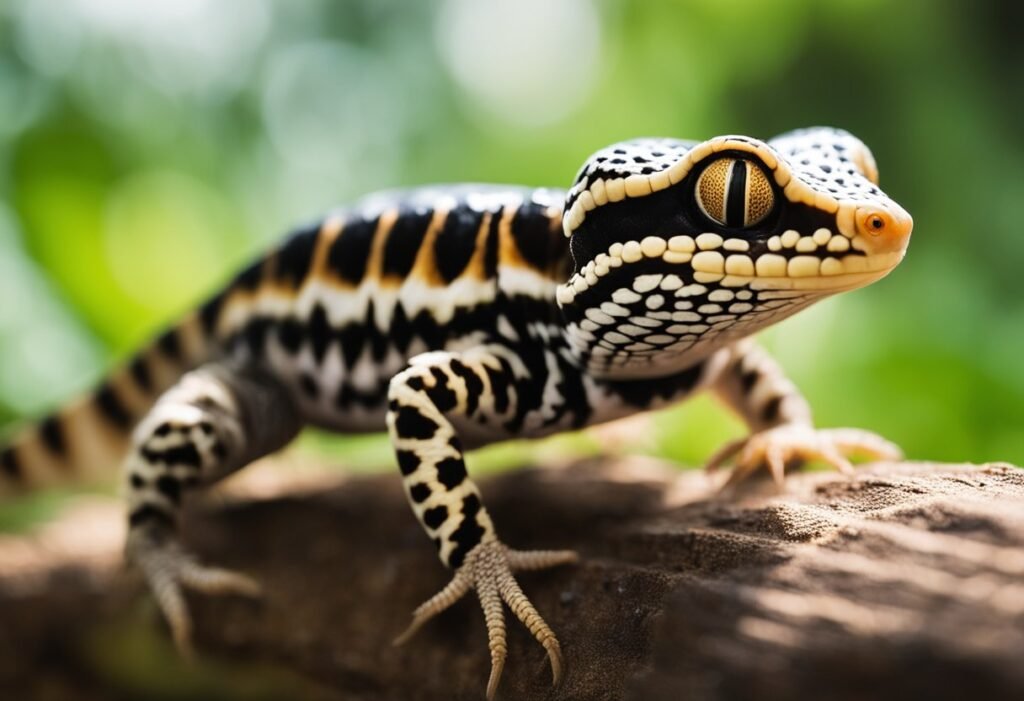
Cockroaches are a common feeder insect for leopard geckos, and for good reason. They offer a variety of nutritional benefits that can help keep your gecko healthy.
One of the main benefits of feeding cockroaches to leopard geckos is their high protein content. Protein is essential for growth and maintenance of muscle and tissue, and is especially important for juvenile geckos who are still developing. Cockroaches also contain a good balance of amino acids, which are the building blocks of protein.
In addition to protein, cockroaches are a good source of fat. While too much fat can be unhealthy for leopard geckos, a moderate amount is necessary for energy and to support other bodily functions. Cockroaches also contain important vitamins and minerals, including calcium, which is essential for strong bones and proper muscle function.
When feeding cockroaches to leopard geckos, it’s important to ensure they are gut-loaded, meaning they have been fed a nutritious diet themselves. This ensures that your gecko is getting the most nutritional benefit from the insects. You can also dust the insects with a calcium supplement to further boost their nutritional value.
Overall, cockroaches are a nutritious and beneficial feeder insect for leopard geckos. By incorporating them into your gecko’s diet, you can help ensure they are getting the nutrients they need to thrive.
Safe Feeding Practices
When feeding our leopard geckos, it’s important to follow safe feeding practices to ensure their health and well-being. Here are some tips to keep in mind:
- Always provide clean, fresh water for your leopard gecko. Change the water daily to prevent bacteria growth.
- Choose appropriately sized prey for your gecko. Feeding them prey that is too large can cause choking or digestive issues. As a general rule, prey should be no larger than the width of your gecko’s head.
- Avoid feeding wild-caught insects to your gecko, as they may carry parasites or pesticides. Instead, purchase insects from a reputable supplier or breed your own.
- Offer a variety of prey items to ensure a balanced diet. In addition to cockroaches, leopard geckos can also eat crickets, mealworms, and waxworms.
- Dust prey items with a calcium and vitamin D3 supplement to ensure proper bone health. It’s important to follow the recommended dosage on the supplement packaging.
- Monitor your gecko’s weight and adjust feeding accordingly. Overfeeding can lead to obesity and other health issues.
By following these safe feeding practices, we can ensure our leopard geckos are healthy and happy.
Types of Cockroaches Suitable for Leopard Geckos
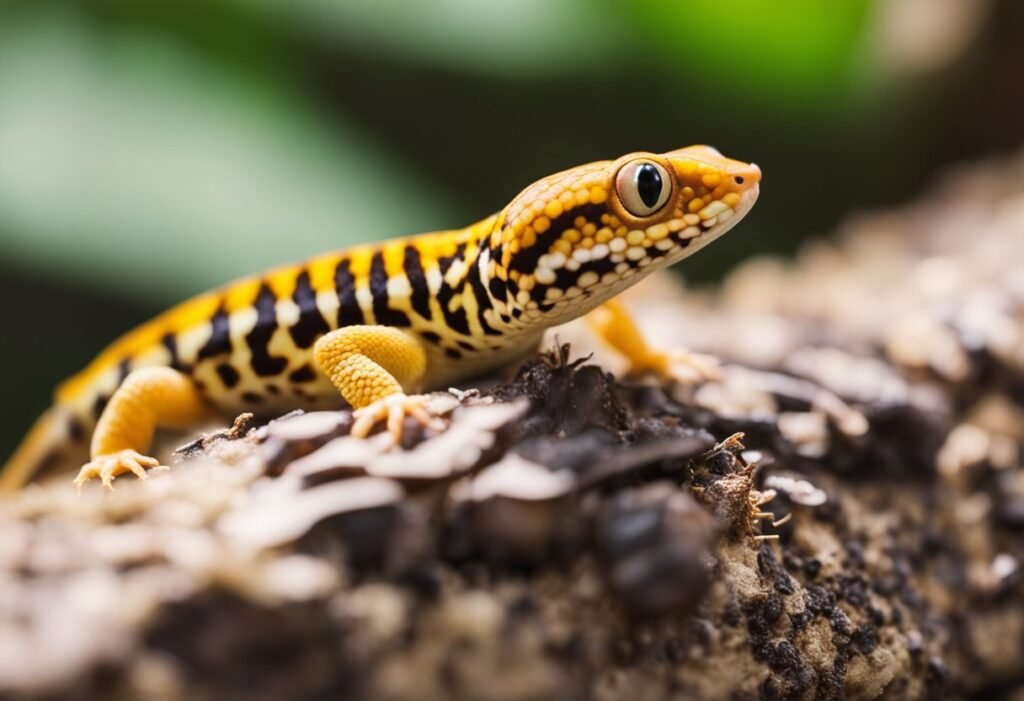
When it comes to feeding leopard geckos, it’s important to provide them with a variety of insects to ensure they receive all the necessary nutrients. Cockroaches are a great addition to a leopard gecko’s diet, but not all types of cockroaches are suitable for them. In this section, we will discuss the types of cockroaches that are safe and healthy for leopard geckos to eat.
Dubia Roaches
Dubia roaches are one of the most popular types of roaches to feed leopard geckos. They are high in protein and low in fat, making them a nutritious option for your gecko. Dubia roaches also have a soft exoskeleton, which makes them easy to digest. They are available in various sizes, making them suitable for geckos of all ages.
Discoid Roaches
Discoid roaches are another type of roach that is safe for leopard geckos to eat. They are similar in nutritional value to Dubia roaches, but they have a harder exoskeleton. This can make them more difficult for younger geckos to digest, so it’s important to choose the appropriate size for your gecko’s age and size.
Turkestan Roaches
Turkestan roaches are a less common type of roach to feed leopard geckos, but they are still a healthy option. They have a similar nutritional value to Dubia and Discoid roaches, but their exoskeleton is even harder. This makes them a better option for adult geckos with stronger jaws and digestive systems.
In conclusion, when feeding cockroaches to your leopard gecko, it’s important to choose the appropriate type based on their age and size. Dubia roaches are a great all-around option, while Discoid and Turkestan roaches may be better suited for specific age ranges. Always ensure that the insects you feed your gecko are properly gut-loaded and dusted with calcium and other necessary supplements.
Preparing Cockroaches for Feeding
When it comes to feeding our leopard geckos, it is essential to prepare the food properly. Cockroaches can be a great source of nutrition for our pets, but we need to make sure they are safe and healthy to eat.
First, we recommend purchasing cockroaches from a reputable breeder or supplier. This ensures that the cockroaches are free from any harmful pesticides or diseases that could harm our geckos.
Before feeding the cockroaches to our geckos, we need to make sure they are gut-loaded. This means feeding them a nutritious diet that will, in turn, provide our geckos with the necessary nutrients. Some good options for gut-loading include fresh fruits and vegetables, high-quality commercial gut-load products, and calcium-rich foods.
We also recommend dusting the cockroaches with calcium powder before feeding them to our geckos. This helps ensure that our geckos are getting enough calcium, which is essential for their bone health.
Finally, it’s important to make sure the cockroaches are an appropriate size for our geckos. We don’t want to feed them anything too large that could cause choking or digestive issues. As a general rule, the size of the cockroach should be no larger than the width of our gecko’s head.
By following these guidelines, we can ensure that our leopard geckos are getting a healthy and nutritious diet that includes cockroaches.
Frequency and Quantity of Cockroaches to Feed

When feeding leopard geckos cockroaches, it is important to consider the frequency and quantity of the feedings. Leopard geckos are known to have a hearty appetite, but it is important not to overfeed them. Overfeeding can lead to obesity and other health problems.
We recommend feeding adult leopard geckos 2-3 appropriately sized cockroaches every other day. Juvenile leopard geckos should be fed daily, with 2-3 appropriately sized cockroaches per feeding.
It is important to note that the size of the cockroach should be appropriate for the size of the leopard gecko. Feeding them cockroaches that are too large can cause digestive problems. We suggest feeding cockroaches that are no larger than the width of the leopard gecko’s head.
We also recommend gut-loading the cockroaches before feeding them to the leopard geckos. This means feeding the cockroaches a nutritious diet for at least 24 hours before feeding them to the leopard geckos. This ensures that the leopard geckos are receiving the necessary nutrients from their food.
In summary, feeding leopard geckos cockroaches can be a nutritious and satisfying meal for them. It is important to feed them the appropriate quantity and size of cockroaches, and to gut-load the cockroaches before feeding.
Potential Risks and Considerations
When feeding cockroaches to leopard geckos, there are a few potential risks and considerations that should be kept in mind.
Firstly, it is important to ensure that the cockroaches being fed are not wild-caught, as they may carry parasites or diseases that could harm the gecko. Instead, it is recommended to purchase cockroaches from a reputable breeder or supplier.
Additionally, some species of cockroaches may be too large or difficult for a leopard gecko to consume, which could lead to choking or other digestive issues. It is important to select appropriately sized cockroaches for the gecko’s age and size.
Another consideration is the nutritional value of cockroaches. While they are a good source of protein, they may not provide all of the necessary vitamins and minerals that a leopard gecko requires. It is important to offer a varied diet that includes other feeder insects and possibly supplements to ensure that the gecko is receiving a balanced diet.
Finally, some geckos may have allergies or sensitivities to certain types of insects, including cockroaches. It is important to monitor the gecko’s behavior and health after introducing new foods to their diet and consult with a veterinarian if any issues arise.
Overall, while cockroaches can be a nutritious and beneficial addition to a leopard gecko’s diet, it is important to consider these potential risks and take appropriate precautions to ensure the gecko’s health and well-being.
Alternatives to Cockroaches in Diet
While cockroaches are a popular and nutritious food source for leopard geckos, some owners may prefer to offer alternative prey items. Here are some other options to consider:
Crickets
Crickets are a staple in the leopard gecko diet and are widely available at pet stores. They are a good source of protein and can be dusted with calcium and vitamin supplements to provide additional nutrition.
Mealworms
Mealworms are another common food item for leopard geckos. They are high in fat, so they should be fed in moderation. It’s also important to gut-load mealworms with nutritious food before feeding them to your gecko.
Superworms
Superworms are larger than mealworms and can provide a more substantial meal for your leopard gecko. Like mealworms, they should be gut-loaded and fed in moderation due to their high fat content.
Waxworms
Waxworms are a high-fat treat that should only be offered occasionally. They are not a staple food item and should be fed in moderation.
Silkworms
Silkworms are a nutritious and low-fat food item that can be a good option for leopard geckos. They are not as widely available as other prey items, but can be ordered online or found at specialty pet stores.
Overall, there are many options for feeding your leopard gecko besides cockroaches. It’s important to offer a varied diet to ensure your gecko is getting all the necessary nutrients. Always research the nutritional content of any new food item before feeding it to your gecko, and be sure to offer a balanced diet.
Frequently Asked Questions
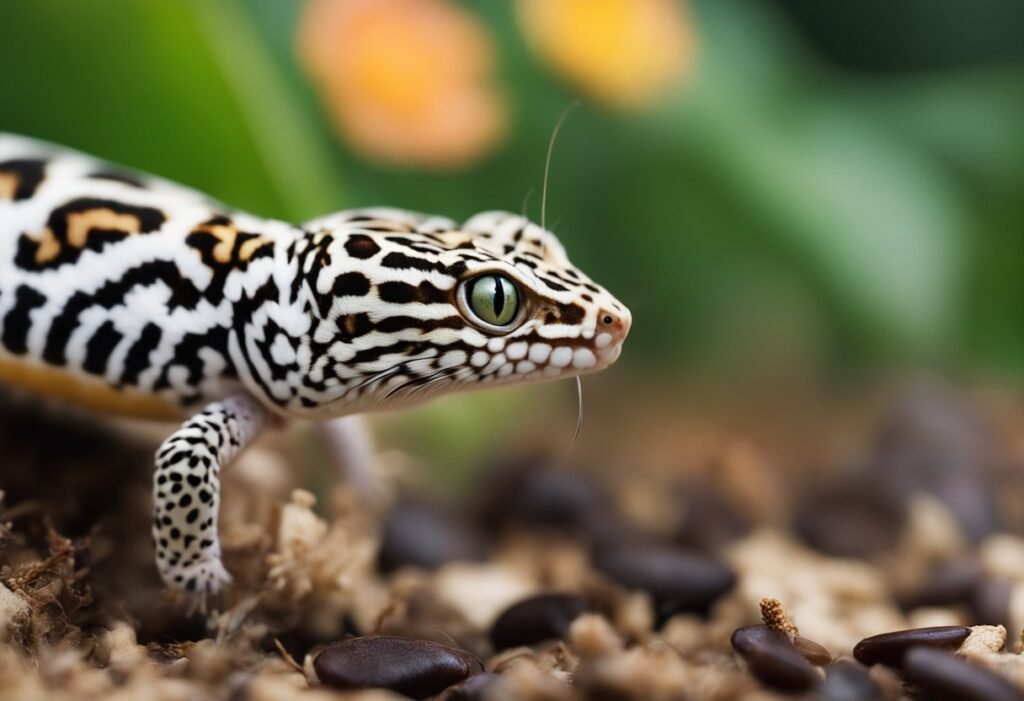
What are the best feeder insects for leopard geckos?
Leopard geckos require a diet that is high in protein and low in fat. The best feeder insects for leopard geckos are crickets, mealworms, and dubia roaches. These insects are readily available in most pet stores and are easy to digest for leopard geckos.
How should dubia roaches be prepared before feeding them to a leopard gecko?
Dubia roaches should be gut-loaded before feeding them to a leopard gecko. This means that the roaches should be fed a nutritious diet for at least 24 hours before being offered to the gecko. Additionally, the roaches should be dusted with calcium and vitamin D3 powder before feeding.
Is it safe to feed leopard geckos with wild-caught insects?
It is generally not recommended to feed leopard geckos with wild-caught insects. Wild-caught insects may carry parasites or diseases that can be harmful to the gecko. It is best to stick with commercially-raised feeder insects that have been properly cared for.
What is the appropriate number of dubia roaches to feed a leopard gecko per meal?
The number of dubia roaches to feed a leopard gecko per meal depends on the size and age of the gecko. As a general rule, adult leopard geckos should be fed 5-8 dubia roaches per meal, while juvenile geckos should be fed 3-5 roaches per meal.
Can leopard geckos have a varied diet including different types of roaches?
Yes, leopard geckos can have a varied diet that includes different types of roaches. In addition to dubia roaches, leopard geckos can also be fed discoid roaches, hissing cockroaches, and lobster roaches. However, it is important to ensure that the roaches are properly gut-loaded and dusted with calcium and vitamin D3 powder before feeding.
Is it necessary to remove uneaten dubia roaches from a leopard gecko’s tank?
Yes, it is necessary to remove uneaten dubia roaches from a leopard gecko’s tank. Dubia roaches can burrow into the substrate and hide, which can lead to health problems for the gecko if they are not removed. Additionally, uneaten roaches can attract pests and create a foul odor in the tank.

